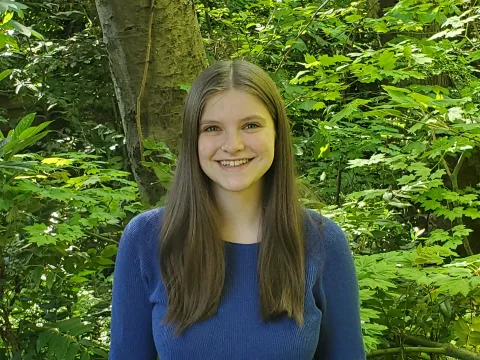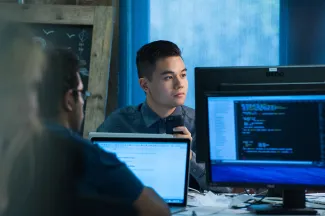“Engineering needs people who care about the world and want to make a difference. Technical skills can be taught much more easily than empathy or teamwork.”

Shaylin Cattell
- Degree:
- Bachelor of Applied Science
- Grad year: 2021
- Program:
- Campus: Vancouver
My name is Shaylin, and I’ve lived in Vancouver for seventeen years. I grew up loving math, logic puzzles, and mystery novels — anything that challenged my problem-solving skills!
During my degree I had three co-op jobs. Through an NSERC USRA, I was an undergraduate research assistant in the UBC Department of Electrical and Computer Engineering. I also worked at Intel as an embedded systems engineer and at Microsoft as a firmware engineer. During my work terms, I co-authored two publications, one in ISPASS 2019 and one in MICRO-53, as well as contributed to a presentation at the Linux Plumbers Conference Android micro-conference. I also worked as a teaching assistant for CPEN 221: Principles of Software Construction. I will be returning to Microsoft as a full-time firmware engineer later this year.
Why did you choose to go into your field of study at UBC?
I attended a couple of the UBC Engineering open houses when I was in high school, and I really loved the sense of community that engineering seemed to have. I was looking for a degree that could challenge me, but would also be practical. The co-op program at UBC seemed like an excellent opportunity to explore career options and discover what I might want to do after graduation.
What has made your time at UBC memorable?
Doing co-op was the most memorable experience for me. I had the opportunity to work in very different jobs — as a research assistant, at a hardware company, and at a software company — which gave me the chance to explore different fields I might be interested in and led to a full-time position after graduation.
I also loved being a teaching assistant for CPEN 221. I ran labs and office hours, which gave me the opportunity to connect with younger students in my program in a meaningful way. I tried to be the type of TA I would have loved to have: someone who tells you that it’s okay to feel like an imposter and to not know everything.
Tell us about your experience in your program. What have you learned that is most valuable?
The most useful skills I learned were not the technical skills (although those have definitely been useful too), but the soft skills. Learning to communicate and work with a team has benefitted me in courses, co-op jobs, and life outside of school. I always get more out of projects, both in terms of technical results and in what I learn, by working in a team instead of working in isolation. I’ve found that building readable, understandable code matters much more than finding the cleverest, most optimized solution to a problem. I’ve also learned that you don’t have to be perfect at everything, and that engineering requires a lot of creativity. There is no formula for solving problems, so you have to be willing to try different and creative solutions.
How are you applying the skills you learned through your studies at UBC?
In each of my co-op jobs, I was very grateful for what I had learned at UBC, whether it was a programming language, a design technique, or general problem-solving and critical-thinking skills. Applying theories I’d learned to real-life problems was satisfying, and it made me eager to learn more when I returned to campus after each job.
What advice would you give a student entering your degree program?
My biggest piece of advice is to get involved and take advantage of opportunities. There are so many experiences you can have in this program, like joining a design team, working in a research lab, being a TA, or getting involved in the student society, and many of them are things you might not have thought you could or would do.
Take risks! Don’t be afraid to reach out to professors for advice or opportunities. I got a co-op job in a research lab by emailing the professor in charge and asking if they had any positions for undergraduate students. That job then helped me get my next co-op job, and so on, leading to experiences I couldn’t have imagined when I started.
Getting outside your comfort zone also helps you figure out what you’re interested in and lets you gain new skills. I tried many things during my degree, and all of them taught me new skills, built lasting friendships and connections, and helped me determine my interests and a path for my future.
How do you feel your degree has benefitted you compared to a different field of study?
Engineering has given me an appreciation for solving problems in both creative and logical ways. Through computer engineering, I’ve been able to explore computer systems from the lowest hardware level to high-level software design. It’s given me the ability to look at a system or problem as a whole, and then break it down into smaller parts so that each individual problem can be solved. Engineering promotes a more holistic approach than other programs I’ve seen. It’s not just about the individual technical problem in front of you. The context of the problem, the ethical or environmental implications, and the need it’s fulfilling are all pieces that matter too.
Where do you find your inspiration for using your degree to make an impact on our world?
I’ve had a couple of professors in my degree who have made a huge difference in how I think about engineering and the world, by teaching me that it’s not just about solving technical problems, but also about caring. They’ve taught me that engineering needs people who care about the world and want to make a difference. Technical skills can be taught much more easily than empathy or teamwork.
Engineering also has a close-knit community and I find inspiration in my classmates. I’ve made friends in my program who I’ve worked with on many different projects throughout the years, and we always have each other’s backs when someone is too busy or struggling.
Throughout high school and university, I’ve met several elementary school students who didn’t realize that programming and engineering are career options for girls. I’m inspired by them to be a role model for women in engineering.
What are your future plans to make a difference in our world?
While at Microsoft, I’m planning to join groups supporting diversity and sustainability in STEM. I would like to mentor women who are interested in engineering throughout my career. Also, I will continue to volunteer in other important areas, including food stability and environmentalism.



